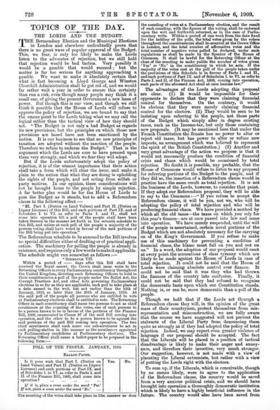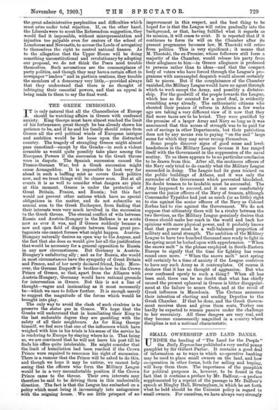TOPICS OF THE DAY.
THE LORDS AND THE BUDGET. rrTE Bermondsey Election and the Municipal Elections in London and elsewhere undoubtedly prove that there is no great wave of popular approval of the Budget. This, we fear, is only too likely to make the Lords listen to the advocates of rejection, but we still hold that rejection would be bad tactics. -Very possibly it would be a gamble that would succeed ; but the matter is far too serious for anything approaching a gamble. We want to make it absolutely certain that what is fast becoming a Lloyd George and Winston Churchill Administration shall be got rid of, and we would far rather wait a year in order to ensure this certainty than run a risk, even though many people may think it a small one, of giving the present Government a new lease of power. But though this is our view, and though we still think it possible that the House of Lords will refuse to approve the policy of rejection, we are bound to say that the omens point to the Lords taking what we may call the logical rather than the tactical view of how they should act. "The Budget is not only a bad Budget as regards its new provisions, but the principles on which those new provisions are based have not been sanctioned by the nation. It is our business to see that no new principles of taxation are adopted without the sanction of the people. Therefore we refuse to endorse the Budget." That is the argument which the Lords are sure to have pressed upon them very strongly, and which we fear they will adopt.
But if the Lords unfortunately adopt the policy of rejection, it is of the utmost importance that their action shall take a form which will clear the issue, and make it plain to the nation that what they are doing is upholding the rights of the people, and not acting from selfish or party motives. In our opinion, these considerations -will not be brought home to the people by simple rejection. A far better plan would be for the House of Lords to pass the Budget as it stands, but to add a Referendum clause to the following effect 97. Fart I. (Duties on Land Values) and Part II. (Duties on Liquor Licenses) of this Bill, and such portions of Part IX. and of Schedules I. to VI. as refer to Parts I. and II., shall not come into operation till a poll of the people shall have been taken thereon in the manner set forth in the seventh schedule to this Bill, and unless at such poll of the people a majority of the persons voting shall have voted in favour of the said portions of the Bill being put into operation."
The Referendum schedule to be annexed to the Bill involves no special difficulties either of drafting or of practical appli- cation. The machinery for polling the people is already in existence, and requires only a fewvords to make it applicable. The schedule might run somewhat as follows :—
"SCHEDULE VII.
Within a period of — days after this Bill shall have received the Royal assent, the Crown shall issue writs to the Returning Officers in every Parliamentary constituency throughout the United Kingdom, directing such Returning Officers to hold in their constituencies a poll of the people under the Ballot Act, the Corrupt Practices Act, and other Acts governing Parliamentary elections in so far as they are applicable, such poll to take place at a date named in the writ, but not earlier than the 10th of January, 1910, or later than the 20th of January, 1910. At the said poll of the people all persons who are entitled to vote at Parliamentary elections shall be entitled to vote. The Returning Officer in each constituency shall name two persons to act as chief scrutineers at the counting of the votes, one of such persons to be a person known to be in favour of the portions of the Finance Bill, 1909, enumerated in Clause 97 of the said Bill coming into operation, and the other to be a person known to be against the said portions of the said Bill coming into operation. The two chief scrutineers shall each name one sub-scrutineer to act in each polling-station in like manner as the scrutineers appointed by Parliamentary candidates at Parliamentary elections. The Returning Officer shall cause a ballot-paper to be prepared in the following form
POLL OF THE PEOPLE. JANUARY, 1910.
BALLOT-PAPER.
Is it your wish that Part I. (Duties on YEs. No.
Land Values) and Part IL (Duties on Liquor
Licenses) and such portions of Part IX. and of Schedules I. to VI. as refer to Parts I. and
II. of the Finance Bill, 1909, shall come into
- operation ? ... ... ... ... ...
If it is, place a cross under the word 'Yes.'
If not, place a cross under the word '?o.' ...
I.
• The counting of the votes shall take place in like_manner as does
the counting of votes at a Parliamentary election, and the result of such counting, with the figures of the voting, shall be endorsed upon the writ and forthwith returned, as in the case of Parlia- mentary writs. Within a period of one week from the date fixed for the holding of the polls, the total votes given by the voters throughout the constituencies shall be counted at the Crown Office in London and the total number of affirmative votes and the total number of negative votes polled be declared, under such regulations as shall be made by the Speaker of the House of Commons. It shall be lawful for the Returning Officer at the close of the counting to make public the number of votes given 'Yes or 'No' in the constituency in which he acts. If the majority of the votes cast at the poll of the people taken under the provisions of this Schedule is in favour of Parts I. and II., and such portions of Part IX. and of Schedules I. to VI. as refer to Parts L and II. of the Finance Act, 1909, coming into operation, such parts of the aforesaid Act shall at once become law."
The advantages of the Lords adopting this proposal are clear. (I) It would be impossible for their opponents to declare that they were claiming financial control for themselves. On the contrary, it would be obvious that they were merely claiming financial control for the electors. (2) They would be seen to be insisting upon referring to the people, not those parts of the Budget which simply alter in degree existing taxes, such as the Income-tax, but only those containing new proposals. (It may be mentioned here that under the French Constitution the Senate has no power to alter or reject old taxes, but has power to alter or refuse new imposts, an arrangement which was balieved to represent the spirit of the British Constitution.) (3) Another and very great advantage of the action we propose is that it would not necessarily produce the condition of financial crisis and chaos which would be occasioned by total rejection. No doubt it is possible, nay probable, that the House of Commons would refuse to listen to any proposal for referring portions of the Budget to the people, and if they did so, the insertion of a Referendum clause would in practice have the same result as total rejection. It is not the business of the Lords, however, to consider that point. If they adopt our Referendum proposal, they will be able to say to the Commons :--" If you refuse to accept the Referendum clause, it will be you, not we, who will be adopting the policy of total rejection and who will be producing financial chaos. We have provided a method by which all the old taxes—the taxes on which you rely for this year's finance—are at once passed into law and come into operation. We have merely suspended, until the will of the people is ascertained, certain novel portions of the Budget which are not absolutely necessary for the carrying on of the King's Government. If you refuse to make use of this machinery for preventing a condition of financial chaos, the blame must fall on you and not on us." In a word, the adoption of our proposal would meet at every point the accusations of class tyranny which are likely to be made against the House of Lords in case of total rejection. It could not be said that the House of Lords were claiming absolute control over finance. It could not be said that it was they who had thrown the finances of the country into confusion. Finally, it could not be said that they had refused to recognise the democratic basis upon which our Constitution stands. Nothing is, or can be, more democratic than a poll of the people.
Though we hold that if the Lords act through a Referendum clause they will, in the opinion of the great mass of their countrymen, protect themselves from mis- representation and misconstruction, we are fully aware that the course we have suggested will not prevent the stalwarts of the Liberal Party from denouncing them quite as strongly as if they had adopted the policy of total rejection. Indeed, we may expect even greater violence of language if our proposal should be accepted. The fact that the Liberals will be placed in a position of tactical disadvantage is likely to make their anger and annoy- ance, and therefore their invective, very much stronger. Our suggestion, however, is not made with a view of placating the Liberal extremists, but rather with a view of putting the Lords right with the electors.
To sum up, if the Liberals, which is conceivable, though by no means likely, were to agree to the application of the Referendum clause, the country would be saved from a -very anxious political crisis, and we should have brought into operation a thoroughly democratic institution which is likely to have a highly beneficial influence in the future, The country would also have been saved from the great administrative perplexities and difficulties which must arise under total rejection. If, on the other hand, the Liberals were to scout the Referendum suggestion, they would find it impossible, without misrepresentation and injustice too palpable even for orators of the school of Limehou se and Newcastle, to accuse the Lords of arrogating to themselves the right to control national finance As to the allegation that the Upper House will be doing something unconstitutional and revolutionary-by adopting our proposal, we do not think the Peers need trouble themselves. Such accusations are the commonplaces of party politics, and though they may have a certain effect in newspaper " leaders" and in partisan orations, they trouble the members of a democracy very little,—provided always that they understand that there is no thought of infringing their essential powers, and that an appeal is being made to them to say the final word.































































 Previous page
Previous page